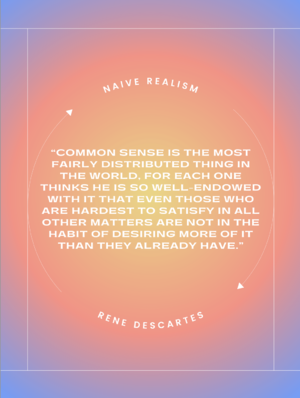The Objectivity Assumption: Difference between revisions
mNo edit summary |
mNo edit summary |
||
| Line 4: | Line 4: | ||
This abstraction arises from the fact that we perceive the world through a unique lens. Our brains create an internal representation of external events by analyzing various features. For example, our perception of color does not directly correspond to reality; rather, colors are synthesized by our brains to distinguish between different light wavelengths. This suggests that color is an illusion, and we cannot know whether other animals perceive it in the same way we do. | This abstraction arises from the fact that we perceive the world through a unique lens. Our brains create an internal representation of external events by analyzing various features. For example, our perception of color does not directly correspond to reality; rather, colors are synthesized by our brains to distinguish between different light wavelengths. This suggests that color is an illusion, and we cannot know whether other animals perceive it in the same way we do. | ||
This assumption of objectivity is an evolved trait that serves our survival by allowing us to navigate our environment without constant questioning. However, in today’s information age—our modern savanna—recognizing our inherent perceptual biases is essential for navigating new dark patterns. While our perceptions are subjective, this does not mean that all perceptions are equally valid or that objective truth is absent. Rather, it highlights the importance of confronting our [[cognitive dissonance]] and actively challenging our [[cognitive biases]] to achieve a more accurate understanding of the world. | This assumption of objectivity is an evolved trait that serves our survival by allowing us to navigate our environment without constant questioning. However, in today’s information age—our modern savanna—recognizing our inherent perceptual biases is essential for navigating new [[Dark Patterns|dark patterns]]. While our perceptions are subjective, this does not mean that all perceptions are equally valid or that objective truth is absent. Rather, it highlights the importance of confronting our [[cognitive dissonance]] and actively challenging our [[cognitive biases]] to achieve a more accurate understanding of the world. | ||
Latest revision as of 09:44, 13 October 2024
We often assume that our perceptions are accurate and objective reflections of reality, but they are actually mental constructs shaped by our minds. Human perception has always been an abstraction rather than a direct replication of the world around us.
This abstraction arises from the fact that we perceive the world through a unique lens. Our brains create an internal representation of external events by analyzing various features. For example, our perception of color does not directly correspond to reality; rather, colors are synthesized by our brains to distinguish between different light wavelengths. This suggests that color is an illusion, and we cannot know whether other animals perceive it in the same way we do.
This assumption of objectivity is an evolved trait that serves our survival by allowing us to navigate our environment without constant questioning. However, in today’s information age—our modern savanna—recognizing our inherent perceptual biases is essential for navigating new dark patterns. While our perceptions are subjective, this does not mean that all perceptions are equally valid or that objective truth is absent. Rather, it highlights the importance of confronting our cognitive dissonance and actively challenging our cognitive biases to achieve a more accurate understanding of the world.
